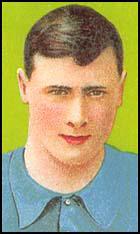Irvine Thornley

Irvine Thornley was born in Hayfield, 1883. After leaving school he became a butcher. He also played football for several local teams before joining Glossop in 1901. At the time Glossop was playing in the Second Division of the Football League. A centre-forward, Thornley scored 42 goals in 79 games for Glossop.
On 7th April, 1904, Thornley was transferred to Manchester City for £800. Soon afterwards the Football Association carried out an investigation into the financial activities of the club. Tom Maley was interviewed and he admitted that he had followed what seemed like standard English practice by making additional payments to all their players. He claimed that if all First Division clubs were investigated, not four would come out "scatheless".
As a result of their investigation, the Football Association suspended Tom Maley from football for life. Seventeen players were fined and suspended until January 1907. Billy Gillespie refused to pay his fine and instead emigrated to the United States.
As Gary James pointed out in Manchester City: The Complete Record: "Basically, the entire squad that had finished as FA Cup-winners in 1904 and narrowly missed out on the Championship two years running were banned. This brought a premature end to City's first golden age."
Journalists were aware that virtually every club in the Football League was making illegal payments to its players. Football writers based in Manchester argued that the club, being a northern side, were being made an example of, and thousands of people complained to the Football Association, but it refused to reduce the bans and fines.
Harry Newbould was appointed as the new manager in July 1906. As a result of the bans and transfers, there were only 11 players available. The first two games in the 1906-07 season resulted in to heavy defeats at the hands of Arsenal (4-1) and Everton (9-1). Manchester City finished 4th from bottom that season. Thornley ended up as the club's top scorer with 13 goals in 29 games.
In March, 1907, Thornley won an international cap playing for England against Wales. Also in the England team that day was Bob Crompton, Colin Veitch, Steve Bloomer and George Wall whereas Wales included Leigh Roose, Billy Meredith and Billy Jones. Thornley also played for the Football League against the Scottish League.
Manchester City finished in 3rd place in the 1907-08 season. However, Manchester United, a team that included City's former stars, Billy Meredith, Herbert Burgess, Sandy Turnbull and Jimmy Bannister won the league championship. Once again Thornley was the club's top scorer with 14 goals in 31 games.
Thornley was in great form in the 1908-09 season and scored another 18 goals. However, the rest of the team played badly and Manchester City finished second from bottom and were relegated.
In 1909 Thornley was appointed club captain. He responded well to this new responsibility and scored 12 goals in the opening 17 games. He was then seriously injured and missed the rest of the season. Thornley had built the foundations for a good campaign and by beating Leeds United 3-0 on 23rd September, 1910, Manchester City guaranteed promotion to the First Division. Hull City could still deny them the championship but they lost their final game and City took the title by one point.
As a reward for Thornley's service, the club awarded him a benefit. Over 40,000 fans turned up to the game and Thornley picked up a cheque for around £1,000.
In 1912 Thornley was transferred to South Shields. During his time at Manchester City he had scored 92 goals in 195 appearances.
Thornley returned to work as a butcher but he continued to play football for South Shields, Hamilton Academicals and Houghton.
Irvine Thornley died in 1955.
